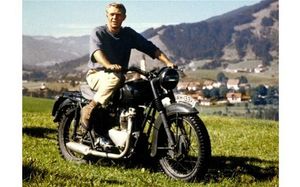The King of Cool was a complicated character
It is four decades since the death of Steve McQueen, yet his face is still arguably the most instantly recognisable in Hollywood.

Many of his best-loved roles were in period dramas, yet his rebellious attitude made him an enduring symbol of youth culture.
And while his death at the age of 50 did not come as a huge surprise – he had been suffering from terminal cancer for two years – it still provoked an outpouring of grief that many found difficult to take in.
Steve McQueen, who died 40 years ago tomorrow, was a man of many contradictions.
Richard Sydenham, whose 2013 biography Steve McQueen: The Cooler King saw him interview more than of the people who were closest to the star, describes the actor as an intensely complicated characacter. A serial philanderer yet a devoted family man; notoriously tight-fisted, yet capable of great generosity to complete strangers.
And behind the rugged features and nonchalant swagger was an deeply insecure man, scarred by the maternal neglect he experienced as a child, and fearful that one day his career would come crashing down.
“The only thing Steve was ever secure about was his appeal to women,” wrote the late Hollywood veteran Robert Vaughn, in the foreword to Sydenham's book.
“Steve was a frightened man about all sorts of things from money, stardom, life in general, but he was especially insecure about his stardom.”
Vaughn, who appeared alongside McQueen in three movies, remembered how his friend had an obsessive rivalry with leading man Yul Brynner during the filming of The Magnificent Seven.
“He was constantly knocking on my door at six in the morning and he’d say, about Brynner, ‘Did you see how big his gun was? Did you see how big his horse was? He was always worried that Yul was going to steal the film from him.”
Sydenham, who lives in Hagley, near Stourbridge, spent 17 years researching his book. As a teenager he was captivated by McQueen's performance in the 1973 prison-break movie Papillon, and the author says McQueen's own troubled youth meant that he could play rebels and underdogs with incredible authenticity.
"He didn't really know his dad, his mum wasn't very good, so he was left to fend for himself," says Sydenham.
"He had to become very streetwise, very early."
For much of his career, McQueen had a bizarre reputation for demanding bulk supplies of free items such as electric razors or clothing whenever he agreed to appear in a film. For years it was put down to the actors' notorious stinginess, but it later emerged that he was actually donating the items to the Boys Republic borstal at Chino, California, where he had spent time during his teenage years. In later life, McQueen returned to the school a number of times to talk to the inmates about his experiences.
While Sydenham says he wanted to explore the star's personality beyond the 'bad boy' cliche, he does acknowledge there was a very dark side to his personality.
In 1971, unhappy with the way the way his troubled movie Le Mans was going, and wracked with guilt over his own infidelities, McQueen asked his second wife Neile Adams if she had ever betrayed him. She insisted she hadn’t.
Unconvinced, he made her take cocaine, and continued with his interrogation, until eventually she confessed to a one-night stand.
Then, in a state of fury, he produced a pistol, and pointed it at her head until she revealed the name of the man with whom she had cheated.
Yet paradoxically, Sydenham says he was always a committed family man.
“Steve loved all his wives deeply, nothing was ever more important to him than his ‘old lady’ and his kids,” he says. “But he also had double standards and a shameless want to sleep with any woman that attracted him."
McQueen did resist the advances of Natalie Wood during the making of Love With The Proper Stranger in 1963. But it was not out of loyalty to his wife, but rather to his friend Robert Wagner to whom Natalie had previously been married. “Loyalty to friends meant a lot to him,” says the author.
While Steve McQueen's name on the cast list was enough to guarantee the success of pretty much any movie, there was one role nobody thought he could play. When he put himself forward for the lead role in The Thomas Crown affair, about a debonair banker who masterminds a $2.6 million heist, he was instantly rejected. The writer didn't want him, the producer and director didn't want him, but with Sean Connery turning the role down, and McQueen insisting he was the man for the role, they ended up with little option.
Sydenham says: "They said 'we love you Steve, you look great on a motorbike or on horseback, but you aren't going to play a millionaire banker masterminding a bank heist in a suit and tie'."
McQueen proved the doubters wrong, receiving huge acclaim for his portrayal of Crown. But that was not to say that there were no hitches along the way.
Sydenham reveals one story where his obsessive attention to detail and notorious penny-pinching drove the crew to distraction. While sorting his wardrobe, McQueen tried on four expensive watches, and hated every one of them. Eventually it was agreed that McQueen’s own watch looked the best, so they allowed him to wear it for the part. And the next day, McQueen issued them with a $250 bill 'watch rental'.
Yet Sydenham says less known were his private acts of generosity. When motorcycle racer Mert Lawwill crushed his hand after coming off his bike, McQueen – who had worked with Lawwill in a film some two years earlier – paid in the region of $100,000 for Lawwill to have his hand rebuilt. He was also known to buy food for beggars on the street.
Steve McQueen would be 90 years old if still alive today. Would he still be the King of Cool, had cancer not taken him away prematurely?
Richard Sydenham thinks so.
"I think if he were still alive today, he would have retired from the film business 20 years ago to spend time with his family, he was very much a family man," he says.
"I think like Paul Newman, Robert Redford and Clint Eastwood, he would have focused more on the producing and directing side. I think he would have made a lot of great movies."




